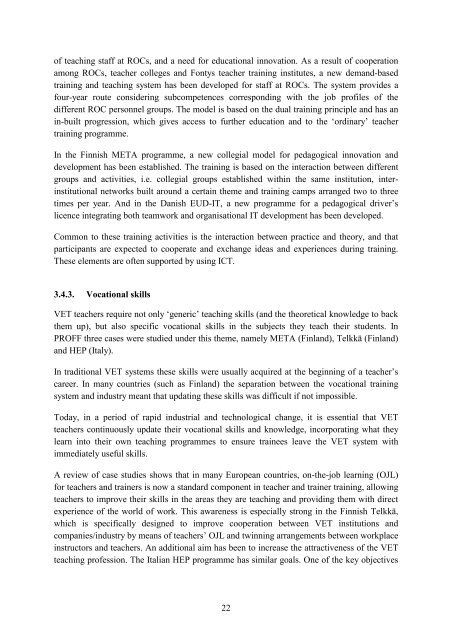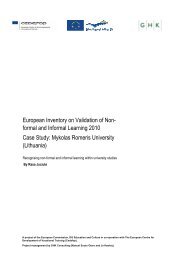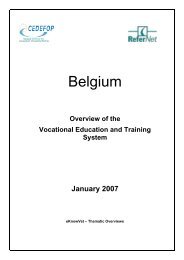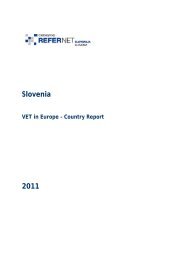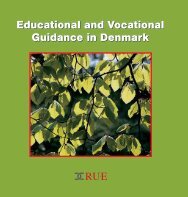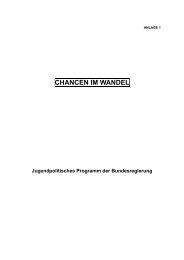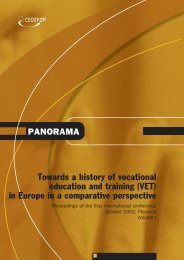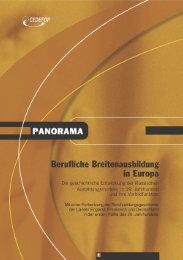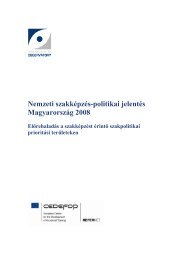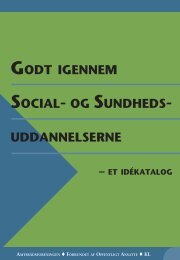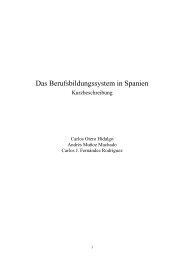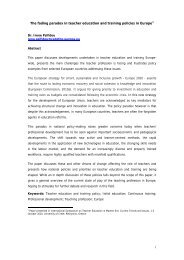PROFF – Professionalisation of VET teachers for the future - Europa
PROFF – Professionalisation of VET teachers for the future - Europa
PROFF – Professionalisation of VET teachers for the future - Europa
Create successful ePaper yourself
Turn your PDF publications into a flip-book with our unique Google optimized e-Paper software.
<strong>of</strong> teaching staff at ROCs, and a need <strong>for</strong> educational innovation. As a result <strong>of</strong> cooperationamong ROCs, teacher colleges and Fontys teacher training institutes, a new demand-basedtraining and teaching system has been developed <strong>for</strong> staff at ROCs. The system provides afour-year route considering subcompetences corresponding with <strong>the</strong> job pr<strong>of</strong>iles <strong>of</strong> <strong>the</strong>different ROC personnel groups. The model is based on <strong>the</strong> dual training principle and has anin-built progression, which gives access to fur<strong>the</strong>r education and to <strong>the</strong> ‘ordinary’ teachertraining programme.In <strong>the</strong> Finnish META programme, a new collegial model <strong>for</strong> pedagogical innovation anddevelopment has been established. The training is based on <strong>the</strong> interaction between differentgroups and activities, i.e. collegial groups established within <strong>the</strong> same institution, interinstitutionalnetworks built around a certain <strong>the</strong>me and training camps arranged two to threetimes per year. And in <strong>the</strong> Danish EUD-IT, a new programme <strong>for</strong> a pedagogical driver’slicence integrating both teamwork and organisational IT development has been developed.Common to <strong>the</strong>se training activities is <strong>the</strong> interaction between practice and <strong>the</strong>ory, and thatparticipants are expected to cooperate and exchange ideas and experiences during training.These elements are <strong>of</strong>ten supported by using ICT.3.4.3. Vocational skills<strong>VET</strong> <strong>teachers</strong> require not only ‘generic’ teaching skills (and <strong>the</strong> <strong>the</strong>oretical knowledge to back<strong>the</strong>m up), but also specific vocational skills in <strong>the</strong> subjects <strong>the</strong>y teach <strong>the</strong>ir students. In<strong>PROFF</strong> three cases were studied under this <strong>the</strong>me, namely META (Finland), Telkkä (Finland)and HEP (Italy).In traditional <strong>VET</strong> systems <strong>the</strong>se skills were usually acquired at <strong>the</strong> beginning <strong>of</strong> a teacher’scareer. In many countries (such as Finland) <strong>the</strong> separation between <strong>the</strong> vocational trainingsystem and industry meant that updating <strong>the</strong>se skills was difficult if not impossible.Today, in a period <strong>of</strong> rapid industrial and technological change, it is essential that <strong>VET</strong><strong>teachers</strong> continuously update <strong>the</strong>ir vocational skills and knowledge, incorporating what <strong>the</strong>ylearn into <strong>the</strong>ir own teaching programmes to ensure trainees leave <strong>the</strong> <strong>VET</strong> system withimmediately useful skills.A review <strong>of</strong> case studies shows that in many European countries, on-<strong>the</strong>-job learning (OJL)<strong>for</strong> <strong>teachers</strong> and trainers is now a standard component in teacher and trainer training, allowing<strong>teachers</strong> to improve <strong>the</strong>ir skills in <strong>the</strong> areas <strong>the</strong>y are teaching and providing <strong>the</strong>m with directexperience <strong>of</strong> <strong>the</strong> world <strong>of</strong> work. This awareness is especially strong in <strong>the</strong> Finnish Telkkä,which is specifically designed to improve cooperation between <strong>VET</strong> institutions andcompanies/industry by means <strong>of</strong> <strong>teachers</strong>’ OJL and twinning arrangements between workplaceinstructors and <strong>teachers</strong>. An additional aim has been to increase <strong>the</strong> attractiveness <strong>of</strong> <strong>the</strong> <strong>VET</strong>teaching pr<strong>of</strong>ession. The Italian HEP programme has similar goals. One <strong>of</strong> <strong>the</strong> key objectives22


